
6 Writers: Naoki Urasawa
July 13th, 2010 by david brothers | Tags: 4321, naoki urasawa, pluto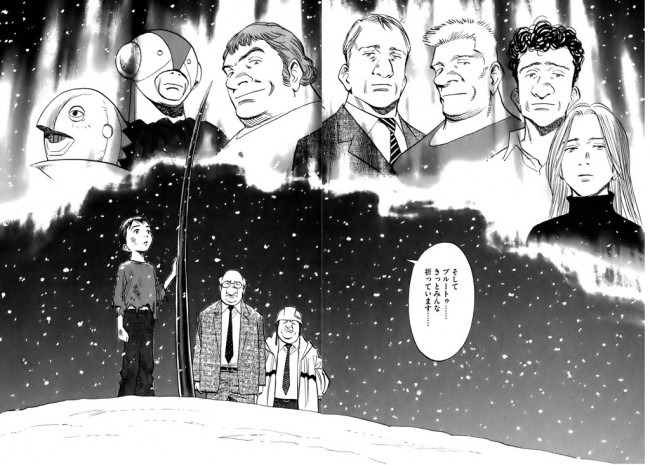
Naoki Urasawa’s eighth volume of Pluto wraps up the series, maybe not in a neat bow, but very well nonetheless. It pulls on almost every string from earlier in the series, mopping up plot points and character arcs and setting the stage for the final confrontation. By this point in the series, any idea you might have had that robots aren’t as human as you are me has been ground into dust by several scenes of irrational acts and open tears. Volume six ended with a robot and a human embracing each other and bawling their eyes out. Gesicht comes face to face with the bad guy of the series and is ordered to destroy him, but refuses to do so. Epsilon demonstrated an amazing level of compassion for human life.
The one thing that Naoki Urasawa’s Pluto: Urasawa x Tezuka keeps coming back to is emotions, and particularly the effect hatred has on life. Hatred was the only emotion that could awaken an advanced robot, because it is the only emotion powerful enough to upset a balanced person. A man lost his family in a war, and in the depths of his grief, he began to hate the world. He created Pluto, the robot that has destroyed the seven most advanced robots in the world, out of that hatred. Behind all of the doomsday plots lies the hatred of a man who has found himself turned obsolete by the passage of time and an invading country.
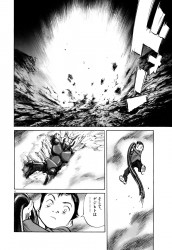
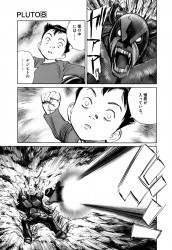
Atom was deactivated, or killed, halfway through Pluto. His father, Professor Tenma, reawakens him by introducing the memory chip of Inspector Gesicht. Like the other advanced robot, only a strong emotion could pull Atom from the state of psychological indecision, for lack of a better term, that kept him deactivated. In Gesicht’s final moments, he was consumed with sadness, self-loathing, feelings of betrayal, and yes, maybe even a little hatred. the memory chip did the trick. It woke Atom up by giving him the capacity for complete and total hatred.
What’s crucial here is that Atom was not given hatred. The chip did not say, “Here, hate.” He was given the capacity for hatred. It logically follows that robots did not previously have the capacity for hatred. They can be happy, they can be sad, they can show compassion, and they can cry rivers of tears, but they cannot hate. Why? What is it about hate that makes it so forbidden?
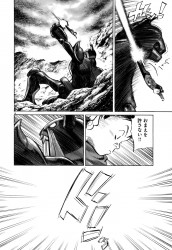
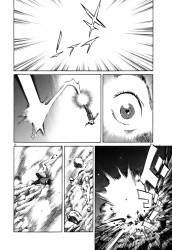
Have you ever actually hated someone? I don’t mean “hate” like most people do, where they hate peas or Joss Whedon or Glenn Beck. That isn’t hate at all. I definitely don’t mean the lazy, impotent, cowardly hatred at the basis of white supremacy, or the hatred by default of most bigotry. I mean the kind of hate that sits in your heart like a little ball of lead. The kind of hate that lets you look at another man dead in his eyes and wish more than anything else that you had the power to make him stop living, stop breathing your air, or just shrivel up and wink out of existence. The sort of hate that makes you take a poke at him just to see what would happen, except you know exactly what’s coming next, you just don’t have enough regard for your fellow man to do the right thing and walk away. Hate is antisocial.
Here is a fact: hate burns. You cannot passively hate. I think a lot of comics people praise to the heavens and claim are nice are, at best, polite. That isn’t hate. That’s disinterest, dislike at most. Hate takes effort. If you hate someone, you’re obsessed with him. You think of him when you’re at work, in the shower, or late at night when the thought of him keeps you awake. Just the very thought of him is offensive and inescapable.
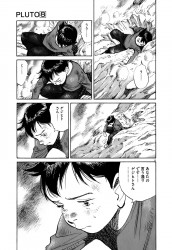
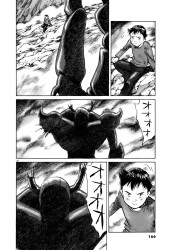
This is unlike most other emotions. If you look at love and grief, both of them have a vital social aspect. Love is when two people find happiness in each other and grief is about the loss of that happiness. There’s a certain amount of interaction required for these emotions to work. You cannot grieve in a vacuum. There has to be something that you’re grieving for. Sadness is maybe a little different, being that you can be sad without help from anyone, but sadness is cold. It’s passive. It doesn’t consume and burn you up the way hate does.
That obsession, that burning, is why hate is so dangerous. It consumes and controls you in a way that other emotions don’t. The other major emotions are a push and pull, a tug of war between you and someone else. Hatred is a one-way street, and as long as that avenue is open, it’s all you get.
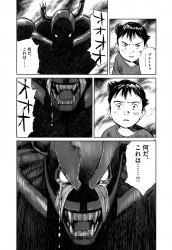
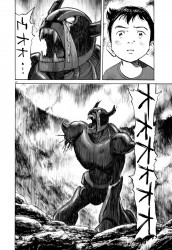
After awakening, Atom is quiet at first. He says nothing and does nothing. He just sits and thinks. He’s focused internally. Then, he draws out the plan for an anti-proton bomb, something that could crack the earth and kill all life on it. He escapes soon after, and walks in the rain with wild eyes and a mean demeanor. He eventually eases back and returns to some semblance of his usual self, but several characters express concern about his mental state. His sister Uran, an empath, believes that Atom, and his emotions, may be so strong that he’ll kill Pluto. She specifically mentions his grief and hate.
In the fight with Pluto, he comes very, very close to doing just that. He pulls off Pluto’s arm, rattles off a list of Pluto’s sins, and then screams, “I’ll never forgive you!” He’s pissed, and he has every reason to be. But then, after a break in the action, he finds himself breaking into tears. He remembers Gesicht saying, “Nothing comes of hatred” just before dying. Atom can’t sustain the energy for hatred. It requires too much focus, too much ill will, to keep going for long. It’s unsustainable.
So: balance. A balanced mind cannot be composed of hatred. You’ll burn out quickly, like a candle put up to a blowtorch. Having the capacity for hatred, though, is different. You could look at it like the last step toward being human. It’s getting in touch with and learning to compensate for your lizard brain, that little tickle that says, “I don’t like him either, let’s kill him.” Knowing that it exists, and what it can do, is important, and you can’t control it until you know exactly what it is. Hate is a fog. It obscures the truth and reality.
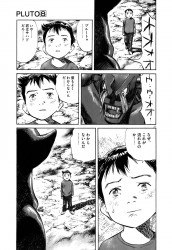
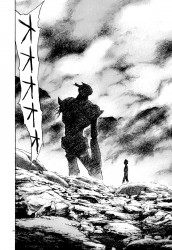
The big threat of Pluto is described as hate personified. It is a man who was so consumed with hate that it was all he had left. Thus, hate is defeated on several levels. Atom defeats his own hate, coming to terms with his grief. The personification of hate, an example of the world-cracking damage hate can do on two legs, is eliminated. A being that was born out of hate finds some measure of peace. Hate, something that held back progress and represented genuine inhumanity in the pages Pluto, was the villain all along. Atom says as much on the final pages.
That’s Naoki Urasawa. Eight volumes and 1500 pages to hammer one point home until you get it through your thick skull. “Hate kills.” Everything before those pages was to emphasize and re-emphasize his point. The careful web of character relationships, exciting action scenes, and intricately drawn figures were build up for that one scene. It was to make you care, to make you relate.
It works.

wow brilliant analysis Bros
Have you read anything of Urasawa’s other than Pluto? Because I don’t think I’ve seen you talk about Monster or 20th Century Boys or any of that, and I would be interested in what you have to say.
@Doug: Monster was my first Urasawa, and I greatly enjoyed it. I’d have to reread it before talking about it. I’m current on 20th Century Boys, and there’s a post in there eventually, but I’m not sure where I’d go with it just yet. I’m enjoying it, though it was a tentative enjoyment for a while there.
[…] Brothers has an interesting piece examining the theme of hate in Naoki Urasawa’s […]
Great post, completely agree and i think the emotions that urasawa brings to the table are what tezuka was kinda missing on that short story on volume 3 of astro. I’m not saying it lack emotion but it wasn’t as effective and you couldn’t relate like in urasawa. Of course this wasn’t his idea i think
till next post
@david brothers: I feel in the long run, 20th Century Boys is unmatched, but it takes a LONG time to get to that point, it’s one of those works that works best in one long sitting.
HAPPY! is also a very good manga by Urasawa, but I’m not sure it’ll ever get released stateside.
and Billy Bat … is … billy bat, is the only thing you can say to describe it
@Nathan: The pacing in 20th is massively frustrating. I think it was v8 that begins AND ends with a “You! You’re Friend!” *friend stays off-screen, no one says his name*
@david brothers: I swear he ends every chapter that way, it gets frustrating (20thCB is a 20+ volume series), though sometimes he does come up with some inspired onces (There was a time where a character was reading an issue of Shonen Sunday and explaining that the symbol means “to be continues” then close up, that I liked)
[…] Brothers has been posting articles about six of his favorite comic writers. Among his choices: Naoki Urasawa, Eiichiro Oda, Inio Asano, and Stan Sakai. Each easy explores key themes in the artist’s […]
ofcourse, at all (monster, 20th century boys or pluto) urasawa-san, make an grey atmosphere, it isnt a happy one, but its like a pain in ur heart, pain when u know the truth